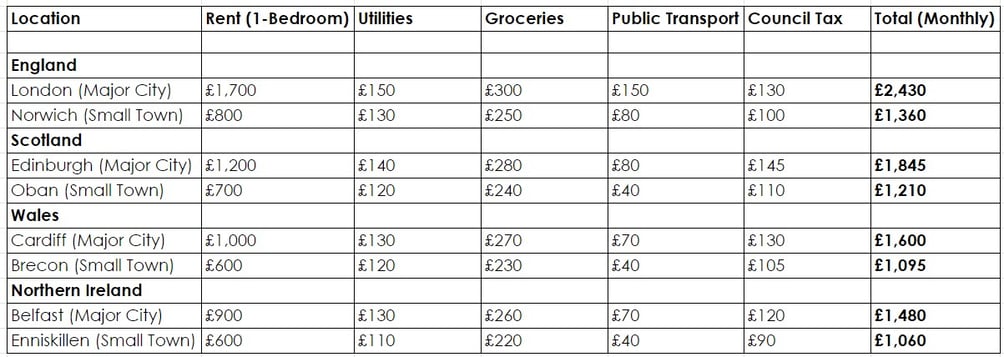Living in the UK
1. Rental Costs and Deposits
Rent: Typically paid monthly in advance; varies widely by location (e.g., London is much more expensive than smaller towns).
Deposits: Landlords can charge up to 5 weeks' rent as a deposit. It must be protected in a government-approved Tenancy Deposit Scheme (TDS).
Council Tax: Tenants are usually responsible for this, and costs depend on the property and local council.
2. Types of Rental Agreements
Assured Shorthold Tenancy (AST): The most common agreement, generally lasting 6-12 months, after which it may roll into a periodic tenancy.
Houses in Multiple Occupation (HMO): Renting a room in a shared house; common for single tenants. Check if the landlord has the required HMO license.
3. Finding a Property
Platforms: Websites like Rightmove, Zoopla, and OpenRent are widely used.
Letting Agents: Often assist in the process but may charge fees for reference checks or holding deposits (these are capped by law).
Private Landlords: Can be found on Gumtree or local community groups, but beware of scams.
4. Required Documents
Landlords and agents will conduct a "Right to Rent" check and request:
Passport or National Identity Card (for EU citizens, a Settled/Pre-settled Status document may also be required post-Brexit).
Proof of income (e.g., employment contract, pay slips, or bank statements).
References (from a previous landlord or employer).
5. Understanding Your Responsibilities
Utilities: Tenants are usually responsible for paying gas, electricity, water, and internet bills unless stated otherwise in the agreement.
Maintenance: Report issues promptly to the landlord. They are responsible for major repairs (e.g., heating, structural issues), but tenants must keep the property clean and undamaged.
6. Know Your Rights
Tenant Rights: You have the right to a safe, habitable property. Landlords must follow eviction laws and cannot harass tenants.
Eviction: A landlord must give written notice and follow legal procedures to evict you (e.g., a Section 21 or Section 8 notice).
Repairs and Safety: Landlords must ensure gas appliances are checked annually and provide a gas safety certificate.
7. Common Scams
Fake Listings: Avoid sending money upfront without visiting the property or confirming the legitimacy of the landlord.
Illegal Subletting: Ensure the person renting to you is the rightful landlord or an authorized agent.
8. Negotiation and Contracts
Rent Negotiation: In some cases, you can negotiate rent.
Read the Contract: Ensure all terms, including break clauses, are clear. If unsure, get advice from a tenants’ rights organization like Shelter.
dfs
9. Moving In
Inventory Check: Before moving in, review and sign an inventory list of items and property conditions to avoid disputes when leaving.
Insurance: Consider tenant insurance to protect your belongings.
10. Post-Brexit Considerations for Romanians
Settled/Pre-settled Status: If you're living and working in the UK, ensure your immigration status is clear. This is critical for securing housing and employment.


1. Public Transportation in the UK
The UK has an extensive public transport network, but costs and availability vary by region.
Key Transport Options:
Trains:
Best for medium to long-distance travel between cities and towns.
Costs: Highly variable. E.g., a single ticket from London to Cambridge could cost £20–£30 without discounts.
Discounts: Consider a Railcard (£30/year), offering 1/3 off fares (e.g., for 16-25, 26-30, or two together).
Book in advance for cheaper tickets on apps like Trainline or National Rail.
Buses and Coaches:
Local buses are common in towns and cities; intercity coaches like National Express or Megabus are budget-friendly.
Costs: City buses cost around £2–£3 per ride. Monthly passes (e.g., London’s Oyster Card) can cost £60–£120 depending on zones.
Underground/Metro Systems:
Found in major cities like London (Tube), Newcastle (Metro), and Glasgow.
Costs: London Tube fares are £2.80–£5 per trip; daily caps apply.
Taxis and Ride-Hailing:
Taxis are expensive, with costs of £10–£15 for short trips.
Ride-hailing apps like Uber, Bolt, or Ola are more affordable but not always available in rural areas.
Cycling:
Many cities, like Cambridge and Bristol, are bike-friendly. Some have bike-sharing schemes (e.g., Santander Cycles in London).
Costs: Buying a decent bike costs £300–£600. Renting is often £2/hour.
2. Costs of Owning a Car in the UK
Owning a car provides freedom but comes with significant costs, which can vary depending on the car's make, model, and fuel efficiency.
Initial Costs:
Buying a Car:
Used car: £3,000–£10,000 (affordable brands like Ford or Vauxhall).
New car: £15,000+ for budget models.
Driving License: If you have a Romanian license, it is valid in the UK.
Recurring Costs:
Fuel:
Average petrol/diesel prices: ~£1.50–£1.80 per litre.
Monthly costs: £100–£300 depending on usage.
Insurance:
Cost: £500–£1,200/year, higher for young drivers or those new to the UK.
Tips: Build a no-claims discount to reduce costs over time.
Road Tax:
Based on emissions; £0–£600/year. Electric cars currently have £0 tax (subject to future changes).
MOT and Servicing:
MOT (Annual Safety Check): ~£50/year.
Regular Servicing: ~£150–£300/year.
Parking:
Urban areas: Residential permits cost £50–£200/year; city center parking is often £2–£5/hour.
Congestion Charges:
London: £15/day to drive in the Congestion Zone (Mon-Fri, 7 am–6 pm). Ultra Low Emission Zone (ULEZ) charges apply for older cars.
Monthly Cost
Public Transport = £100 to £300 Car Ownership = 250£ to £600+
Contact
contact@recruit-spot.co.uk
+44(0)7445771706 / +40(0)740945960
© 2024. All rights reserved.
